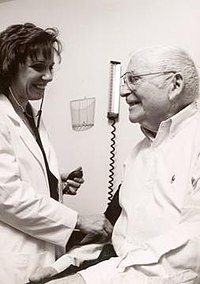
Photo from wikipedia
Abstract:Medication assisted treatment (MAT) is an evidence-based solution to combatting opioid use disorder (OUD); however, MAT is largely unavailable in rural areas. This study investigated clinician and staff perceptions related… Click to show full abstract
Abstract:Medication assisted treatment (MAT) is an evidence-based solution to combatting opioid use disorder (OUD); however, MAT is largely unavailable in rural areas. This study investigated clinician and staff perceptions related to OUD and MAT, in particular, buprenorphine treatment, in rural primary care practices. In this qualitative study, we interviewed staff members from 42 practices and analyzed the data using a grounded hermeneutic editing approach. Four key themes emerged: 1) policies and procedures to reduce opioid prescribing were already in place, 2) there was an emotional toll to treating "those types" of patients, 3) there is a lack of local resources for help with chronic pain and buprenorphine treatment, and 4) there is a strong desire to help local patients and community members but hesitancy to engage in buprenorphine treatment. Although there was almost no provision of MAT, many practices were interested in learning more to help their communities.
Journal Title: Journal of Health Care for the Poor and Underserved
Year Published: 2022
Link to full text (if available)
Share on Social Media: Sign Up to like & get
recommendations!